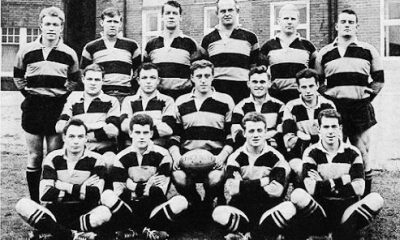
 In hindsight, Sam Warburton might have seen the writing on the wall as well as everywhere else on the day of his reappointment as captain of Wales. September 23 brought an unequivocal statement from interim head coach Rob Howley on his choice of leader for the coming season. Sam Warburton is a great captain,” he said. “He will continue to captain Wales. He will captain us for the autumn series and into the Six Nations.”
In hindsight, Sam Warburton might have seen the writing on the wall as well as everywhere else on the day of his reappointment as captain of Wales. September 23 brought an unequivocal statement from interim head coach Rob Howley on his choice of leader for the coming season. Sam Warburton is a great captain,” he said. “He will continue to captain Wales. He will captain us for the autumn series and into the Six Nations.”
As resounding votes of confidence go, it left no room for doubt even if Howley did offer a throwaway sentence as flimsy insurance against his falling hostage to fortune: “I believe at this moment in time that Sam Warburton is the best captain to take us forward.”
How ironic that it can be seen in retrospect as the beginning of the end of a reign longer than any other by a British player with the solitary exception of Will Carling.
Howley’s belief began to waver before the first match six weeks after giving his skipper the big rap. Warburton had recovered from a cheekbone injury but Wales opted to leave him out and enter into their shambolic mismatch against Australia under a different captain, Gethin Jenkins.
Warburton, his openside position occupied by Justin Tipuric, duly returned at blindside against Argentina seven days later, minus the armband. Jenkins kept it and when he departed during the last quarter, Alun-Wyn Jones took charge.
With both rested against Japan, Warburton regained the captaincy for what turned out to be one match only. How much the autumn experience brought him to the conclusion that he would be better off rejoining the ranks only he knows but it would inevitably have taken a toll.
For all his success, Warburton’s innate humility ensured that he would never take the captaincy for granted, much less use it as a vehicle for self-aggrandisement. His sole aim now will be to raise his game sufficiently to reclaim his position from Justin Tipuric.
As for Howley, he ought to have known better than tempt fate by making long-range assurances in a notoriously fickle business. His prediction of Warburton’s leadership lasting on into the Six Nations amounted to surprisingly short shrift of Tipuric’s presence as a formidable alternative on the openside of the back row.
Tuesday’s announcement of the Six Nations is due to confirm Jones’ appointment, one forced upon Howley by the changing landscape of the back row in general which leaves Warburton on the outside looking in, at least for now.
Nothing, though, can detract from the fact that Warburton has done things the vast majority of international players only dream about, like captaining the Lions in a winning series and his country to a Grand Slam.
Only two other players have achieved that double in post-war competition – John Dawes for the Lions and Wales in 1971, Martin Johnson with the Lions in South Africa in 1997 followed by an English Grand Slam six years later. By winning the World Cup that same year, he, alone, has achieved such a treble.
While Johnson made sure he got out at the top, another gigantic captain discovered to his cost that a winning record without equal before or since provided no immunity from the sack.
Wayne ‘Buck’ Shelford never knew what it was like to make a losing speech on behalf of the All Blacks. In 31 matches, they never lost one under his leadership which made his removal, in the summer of 1990, seem all the more brutal.
When push came to shove, his record and standing in the game counted for nothing. Shelford has always maintained that nobody ever gave him ‘a decent reason’ for being elbowed aside even if his successor at No. 8, Zinzan Brooke, turned out to be more than a bit useful.
If Warburton found the speechifying and the Press conferences onerous, it never showed. His innate decency ensured that he never let the game down, always ready to go the extra mile in support of a good cause.
When ScrumV’s touchline reporter Phil Steele launched his book at Taffs Well on a cold, wet night before Christmas, he invited various members of the Wales team. One turned up and stood discreetly on one side of the clubhouse – the captain.
Just as Carling captained England at 22, so Warburton first led Wales at the same age. Unlike his English counterpart, he was never in danger of losing it, as Carling infamously did for a few days before the 1995 World Cup, after referring to the outsized RFU committee as ’57 old farts’.
Carling came back from that largely because the rest of the England team stood four-square behind him and refused to accept the captaincy. Warburton is too good not to play himself back into the starting team sooner than later provided he stays in one piece.
In this year, of all years, he needs an uninterrupted run all the way to New Zealand in the summer.


Latest News
Super Rugby Americas: Round Ten Review

British and Irish Lions
British and Irish Lions: Biggest winners and losers from Andy Farrell’s selection























You must be logged in to post a comment Login